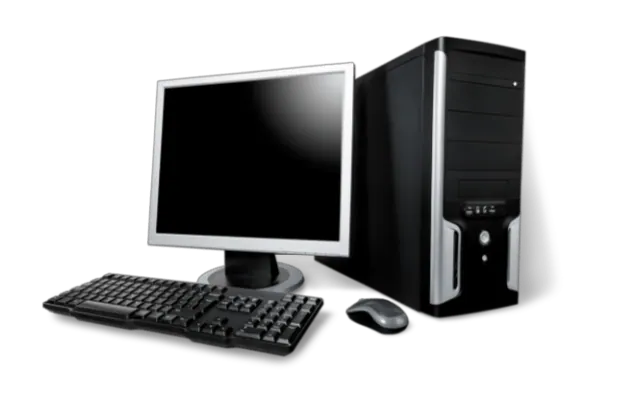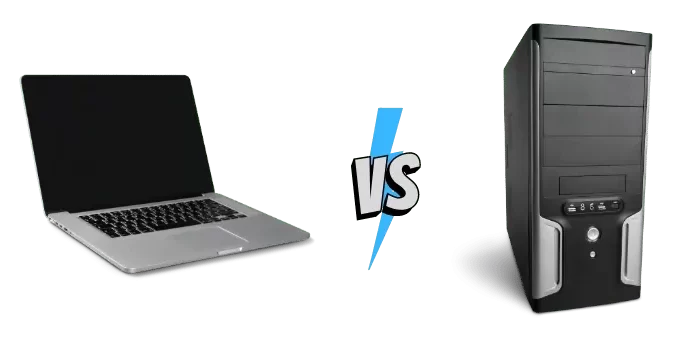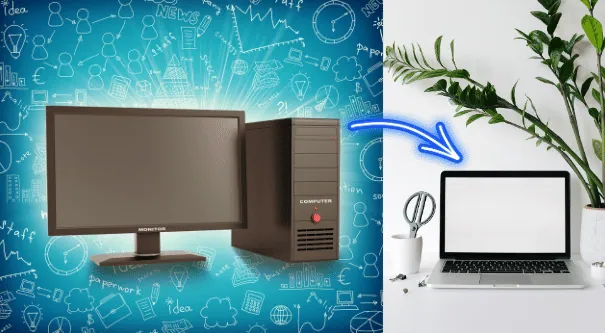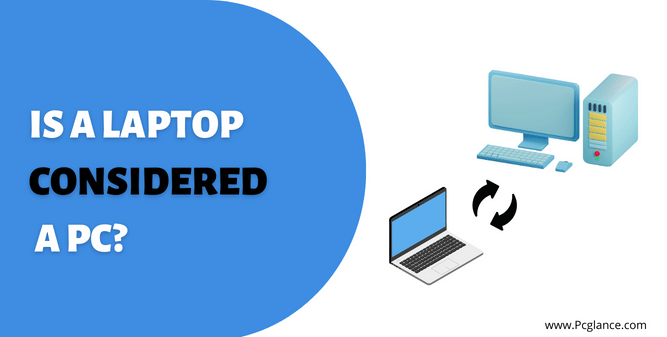As technology advances, laptops have adopted many features that were once exclusive to PCs, making the distinction between the two increasingly difficult. Laptops are now more popular than ever, with many people using them as their main computer for both personal and professional use.
However, this has led to some debate over “Is a laptop considered a PC?” So in this article, we’ll take a look at the similarities and differences between laptops and regular PCs to help you make up your mind in order determine if a laptop should be classified as a PC or not.
In order to fully grasp the nature of the ongoing debate over whether a laptop can be considered a personal computer, it is essential to first establish a clear definition of both a PC (Personal Computer), and a laptop?
Definition of a PC (Personal Computer):

A Personal Computer, or PC, is a desktop computer that is intended for personal use. These computers are commonly used for a variety of tasks such as typing documents, browsing the internet, playing games, editing multimedia, and running software applications.
A PC typically consists of a central processing unit (CPU), memory (RAM), storage (hard drive or solid-state drive), and input/output devices such as a keyboard, mouse, and monitor. Additionally, a PC can also include other components such as a graphics card, sound card, network card, optical drive, and various ports for connecting peripherals like printers, external hard drives, and USB devices.
PCs are user-friendly and easy to use, making them a popular choice among consumers for both personal and professional use. They are also highly customizable, allowing users to upgrade or replace components to improve performance and meet the needs of different users.
Definition of a Laptop:

A laptop, also referred to as a notebook, is a compact computer that can be easily carried and used in various locations. It provides the same capabilities as a traditional desktop computer, but with the added convenience of being able to take it with you on the go. A laptop typically has a built-in keyboard, touchpad or trackpad, and a display screen that can vary in size.
Most importantly, they have a battery and power adapter that gives users the ability to work independently of a power outlet. Laptops can be used for various activities like browsing the internet, working on documents, and running software applications. They are commonly used by professionals, students, and individuals for personal use.
Also Read: 13 Tips on How to Keep Laptop Cool in Hot Car
Laptop Vs PC: Similarities and Differences

When it comes to laptops vs. PCs, there are some similarities and some differences:
| Similarities | Differences |
| One of the main similarities between laptops and PCs is that they can both run the same operating system. This means that whether you have a laptop or a PC, you can use the same software and applications. | One of the main differences is that laptops are portable and can be taken with you on the go, while PCs are typically stationary and are meant to be used in a fixed location |
| Both laptops and PCs have similar hardware components, such as a processor, memory, and storage. | Laptops have built-in keyboards and touchpads, while PCs often require external keyboard and mouse. |
| Both laptops and PCs can be used for gaming, photo editing, video editing, and other demanding tasks. | Laptops have smaller screens and less powerful hardware than PCs, making them less suitable for high-performance tasks. |
| Both can connect to the internet and run various software programs and applications | Laptops have a smaller form factor and less expandability than PCs. |
| Both laptops and PCs can connect to external devices such as printers and external hard drives. | Laptops are often more costly than similar spec PCs due to their portable and compact design. |
Now that we have examined the similarities and differences between a laptop and a PC, it is time to address the question of whether a laptop can be considered a PC.
Also read : 15 Common laptop problems and solutions
Is a Laptop a PC (Explained)

The discussion over whether a laptop can be considered a PC revolves around the question of whether a laptop’s portability and compact design disqualify it from being considered a true PC. Some argue that a PC must be a desktop computer, and therefore a laptop cannot be classified as a PC because they lack the ability to be upgraded or have certain components added, such as additional graphics cards or storage drives.
Additionally, laptops often have smaller screens and less powerful hardware than desktop PCs, which can limit their capabilities for certain tasks such as high-level gaming or video editing. However, others argue that laptops are PCs because they possess many of the same features as traditional desktop computers, such as a keyboard, mouse, and monitor.
They also have the capability to perform similar tasks, such as web browsing, document creation, and video streaming. Furthermore, laptops have become increasingly powerful over time, with many models now offering similar performance to traditional desktop PCs.
Ultimately, the debate over whether a laptop is a PC is a matter of perspective and personal opinion. Some people may view a laptop as a PC while others may not. However, there are certain factors that can classify laptop as a PC in my opinion.
Factors that determine laptop as a PC:
- Compatibility with a commonly used operating system like Windows or MacOS.
- Having similar hardware components such as a CPU, RAM, and storage drive.
- The ability to perform similar tasks to a desktop PC, such as web browsing, running office applications, playing games, multi-tasking, multimedia editing (such as photo or video editing), etc.
The progression of technology has made laptops increasingly powerful and versatile over time. Now, the latest laptops are equipped with powerful processors, large amounts of storage, and high-resolution displays.
They are also equipped with a wide range of ports and expansion options, making them more similar to desktop PCs in terms of capabilities. Today, laptops are capable of running the same software and performing the same tasks as desktop PCs, making a laptop a PC.
FAQ (Is a Laptop Considered a PC)
Are laptops also called computers?
Laptops are computers, also known as portable computers. They have all the components of a desktop computer including CPU, RAM, hard drive, keyboard, touchpad, screen and audio system. The main difference between laptops and desktop computers is that laptops are portable while desktop computers are meant for fixed use.
Is a laptop considered a Desktop?
Laptops and desktops are different types of computers. Laptops are portable with a built-in screen, touchpad and keyboard, running on battery for mobility and internet access on-the-go. Desktops are meant for one-location use, with separate monitor, keyboard, and mouse.
Is a laptop a PC or Mac?
A laptop can be either a PC (personal computer) or a Mac (Apple computer), depending on the operating system it runs. A PC laptop runs on Windows operating system while a Mac laptop runs on macOS (designed specifically for Apple’s hardware)
Are laptops more powerful than desktops?
It’s hard to make a general statement about which type of device is more powerful, because it depends on the specific model and how it’s being used. In general, desktops have more powerful components than laptops, but high-end laptops can now match or exceed the performance of a desktop. It really depends on the user’s needs and preferences.
Can a laptop be used as a desktop PC?
A laptop can be used as a desktop PC by connecting it to an external monitor, keyboard, and mouse.
Are laptops and desktops compatible with the same software?
While most software meant for desktop computers is compatible with laptops, but there are some exceptions. Some software may require specific hardware configurations and may not run on all laptops.
Additionally, some software may perform differently on a laptop compared to a desktop. For instance, a high-end desktop game or application may not run smoothly on a laptop with lower specifications.
Is a gaming laptop considered a pc?
A gaming laptop is classified as a personal computer (PC) due to its possession of all the elements of a conventional desktop computer, yet with the added advantage of mobility.
Usually, it operates on an operating system such as Windows and features comparable hardware components, including a central processing unit (CPU), graphics processing unit (GPU), RAM, a hard drive or solid state drive (SSD), keyboard, touchpad, and display screen.
Conclusion
In conclusion, laptops are considered PCs due to their similar hardware and software components. However, the design and energy consumption of laptops differs from that of desktop PCs.
It is important to consider your specific needs and preferences when choosing between a laptop and a desktop PC. If you need a powerful computer for gaming or video editing and more upgradability options, a desktop PC may be a better option.
However, if you need a computer that you can take with you on the go, a laptop may be the better choice. Ultimately, the choice depends on your individual requirements and preferences. Hence, to answer the question, a laptop is indeed a personal computer.
You May Like to Read:
Upgrading Your Laptop: Can You Add External RAM to a laptop
How Much Does a Laptop Weigh – Laptop Weight Guide
How to Fix White Spot on Laptop Screen ( 4 Ways )

Isaac Smith is the founder and editor of PC Glance, a website that covers computers, laptops, and technology. He is a tech enthusiast and a computer geek who loves to share his insights and help his readers make smart choices when buying tech gadgets or laptops. He is always curious and updated about the latest tech trends.


